【牛津译林版 英语期末复习一本通 】第七讲 六年级下知识复习及专项训练(含答案)
文档属性
| 名称 | 【牛津译林版 英语期末复习一本通 】第七讲 六年级下知识复习及专项训练(含答案) | 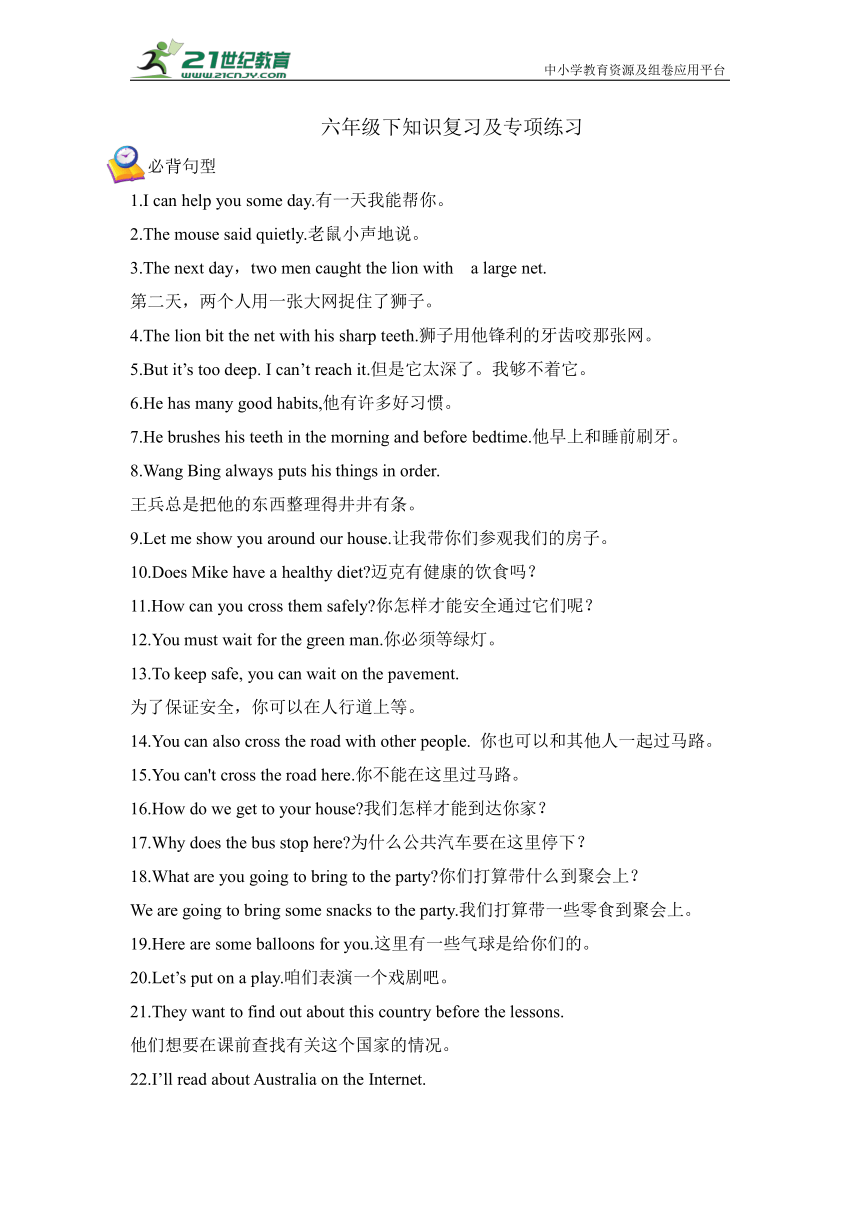 | |
| 格式 | docx | ||
| 文件大小 | 328.3KB | ||
| 资源类型 | 试卷 | ||
| 版本资源 | 牛津译林版 | ||
| 科目 | 英语 | ||
| 更新时间 | 2023-06-19 22:31:52 | ||
图片预览

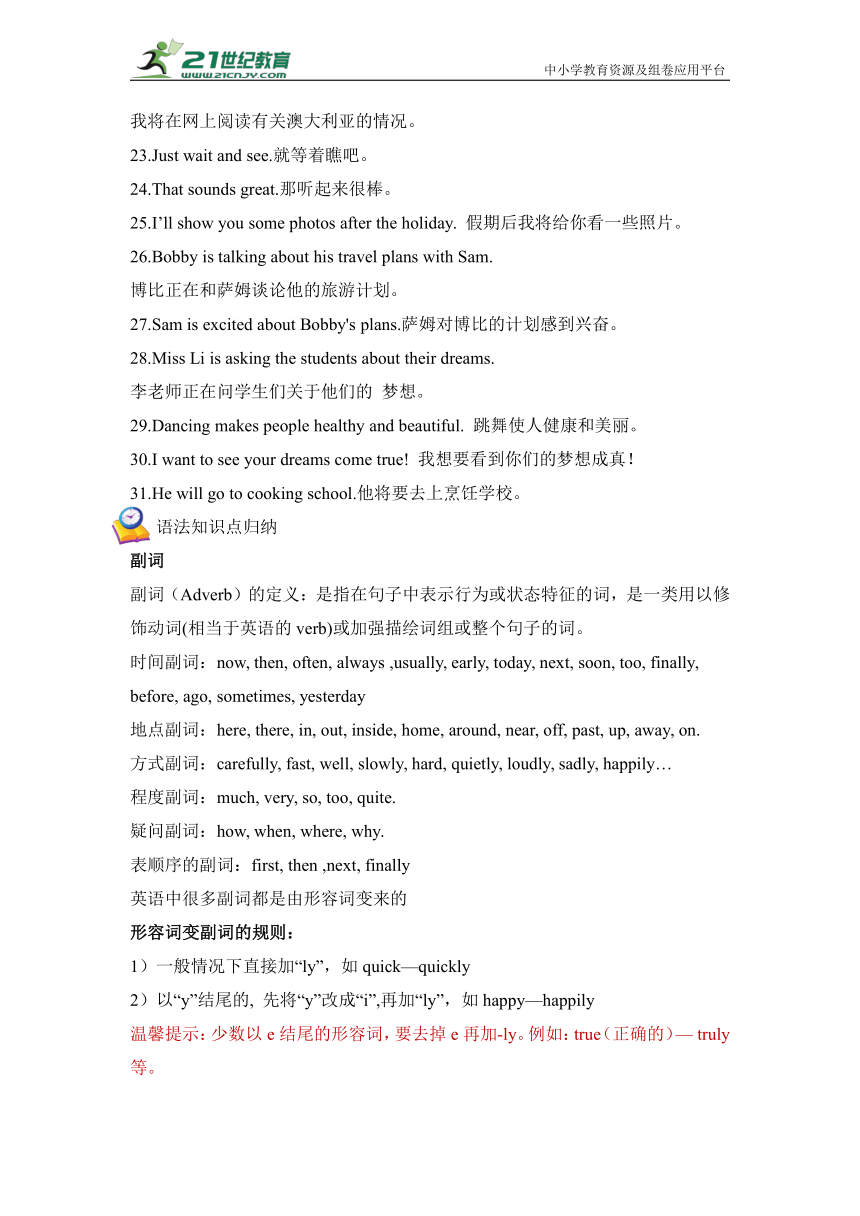
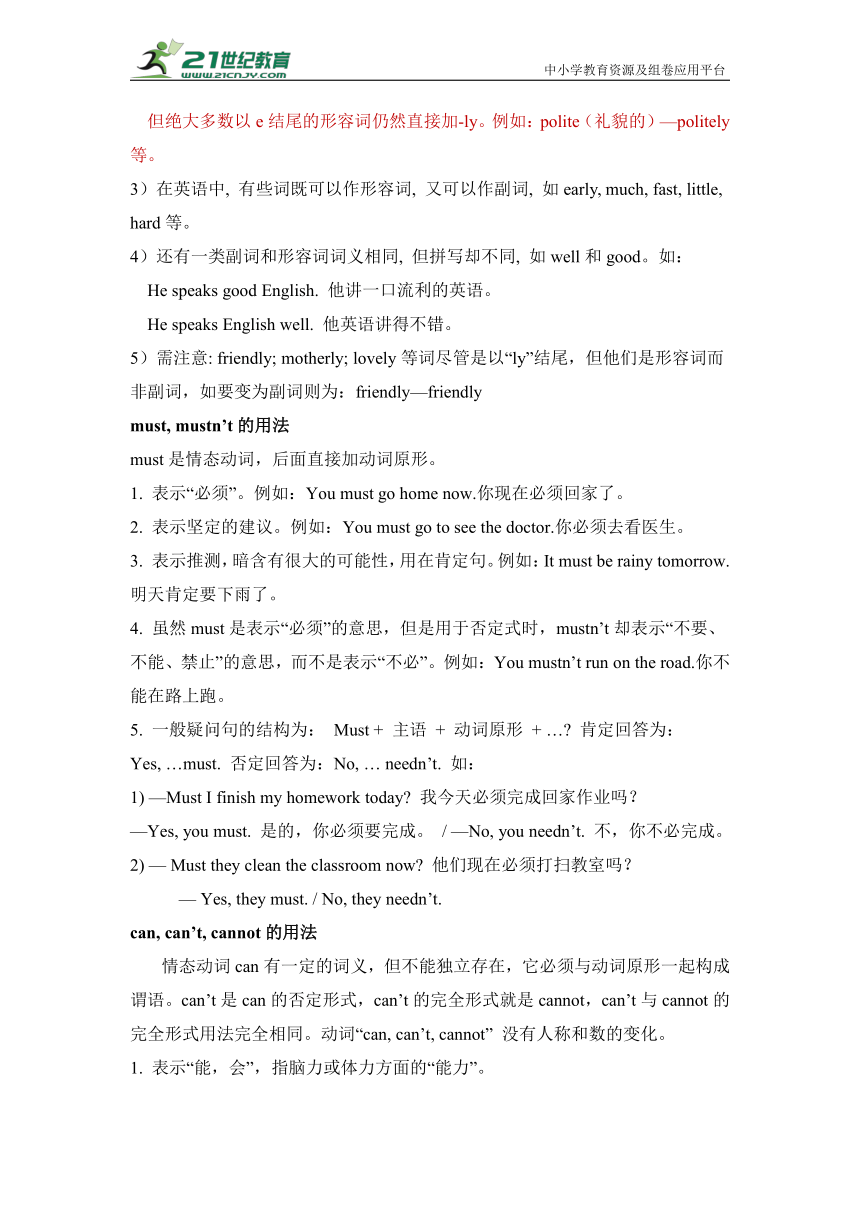
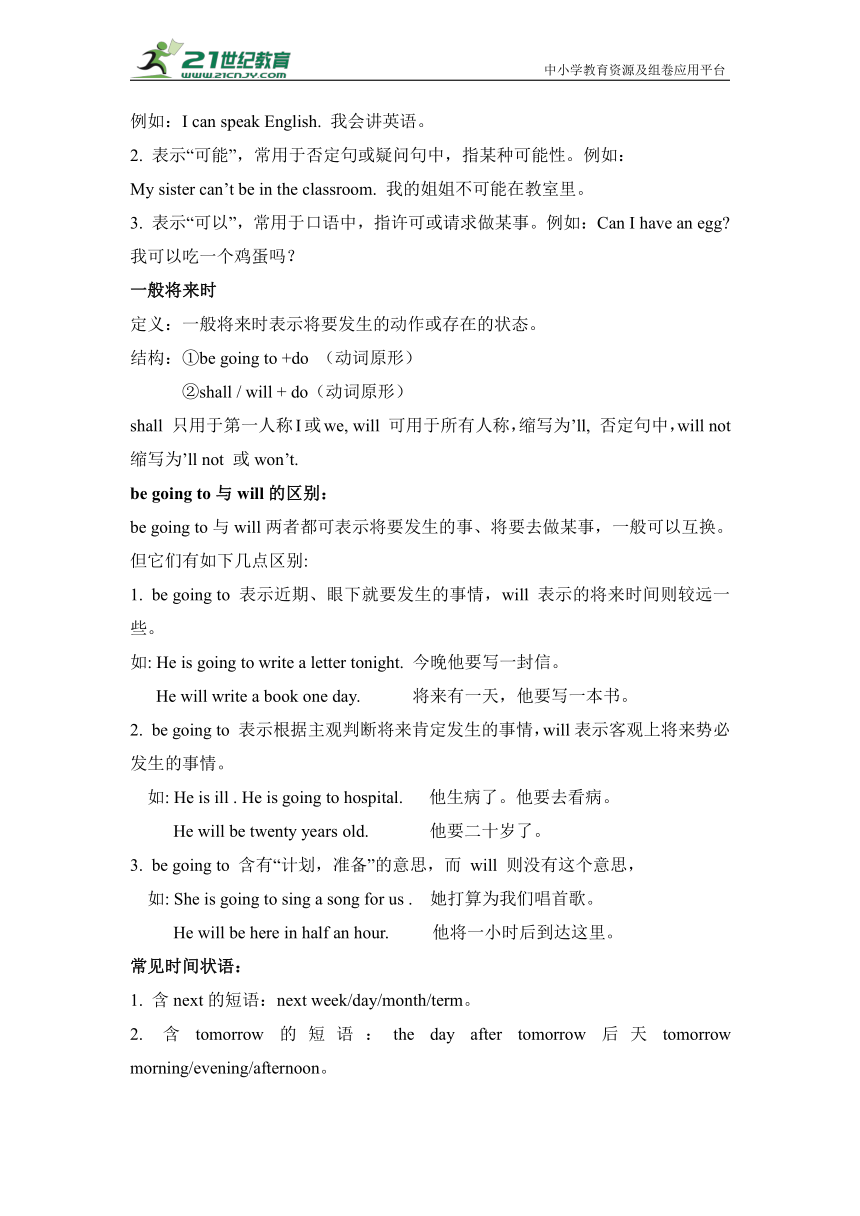
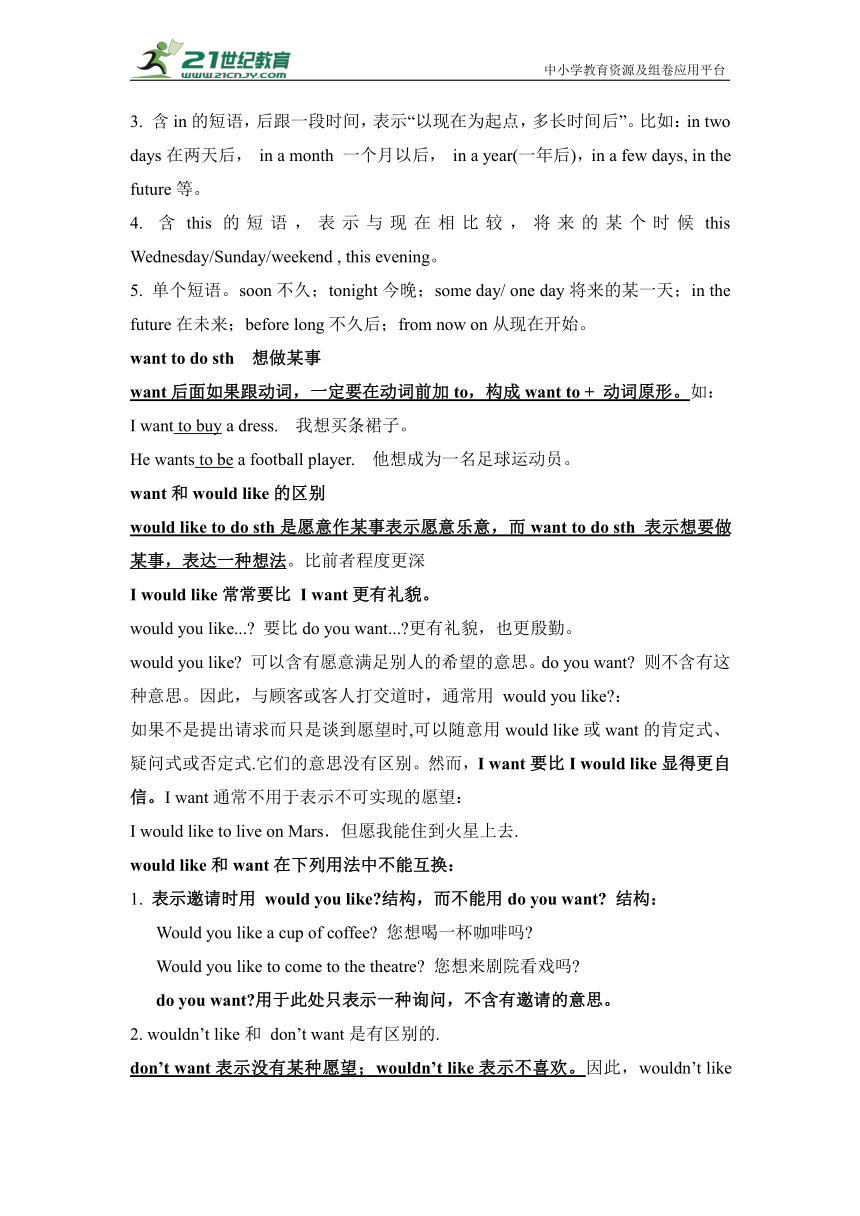
文档简介
中小学教育资源及组卷应用平台
六年级下知识复习及专项练习
必背句型
1.I can help you some day.有一天我能帮你。
2.The mouse said quietly.老鼠小声地说。
3.The next day,two men caught the lion with a large net.
第二天,两个人用一张大网捉住了狮子。
4.The lion bit the net with his sharp teeth.狮子用他锋利的牙齿咬那张网。
5.But it’s too deep. I can’t reach it.但是它太深了。我够不着它。
6.He has many good habits,他有许多好习惯。
7.He brushes his teeth in the morning and before bedtime.他早上和睡前刷牙。
8.Wang Bing always puts his things in order.
王兵总是把他的东西整理得井井有条。
9.Let me show you around our house.让我带你们参观我们的房子。
10.Does Mike have a healthy diet 迈克有健康的饮食吗?
11.How can you cross them safely 你怎样才能安全通过它们呢?
12.You must wait for the green man.你必须等绿灯。
13.To keep safe, you can wait on the pavement.
为了保证安全,你可以在人行道上等。
14.You can also cross the road with other people. 你也可以和其他人一起过马路。
15.You can't cross the road here.你不能在这里过马路。
16.How do we get to your house 我们怎样才能到达你家?
17.Why does the bus stop here 为什么公共汽车要在这里停下?
18.What are you going to bring to the party 你们打算带什么到聚会上?
We are going to bring some snacks to the party.我们打算带一些零食到聚会上。
19.Here are some balloons for you.这里有一些气球是给你们的。
20.Let’s put on a play.咱们表演一个戏剧吧。
21.They want to find out about this country before the lessons.
他们想要在课前查找有关这个国家的情况。
22.I’ll read about Australia on the Internet.
我将在网上阅读有关澳大利亚的情况。
23.Just wait and see.就等着瞧吧。
24.That sounds great.那听起来很棒。
25.I’ll show you some photos after the holiday. 假期后我将给你看一些照片。
26.Bobby is talking about his travel plans with Sam.
博比正在和萨姆谈论他的旅游计划。
27.Sam is excited about Bobby's plans.萨姆对博比的计划感到兴奋。
28.Miss Li is asking the students about their dreams.
李老师正在问学生们关于他们的 梦想。
29.Dancing makes people healthy and beautiful. 跳舞使人健康和美丽。
30.I want to see your dreams come true! 我想要看到你们的梦想成真!
31.He will go to cooking school.他将要去上烹饪学校。
语法知识点归纳
副词
副词(Adverb)的定义:是指在句子中表示行为或状态特征的词,是一类用以修饰动词(相当于英语的verb)或加强描绘词组或整个句子的词。
时间副词:now, then, often, always ,usually, early, today, next, soon, too, finally, before, ago, sometimes, yesterday
地点副词:here, there, in, out, inside, home, around, near, off, past, up, away, on.
方式副词:carefully, fast, well, slowly, hard, quietly, loudly, sadly, happily…
程度副词:much, very, so, too, quite.
疑问副词:how, when, where, why.
表顺序的副词:first, then ,next, finally
英语中很多副词都是由形容词变来的
形容词变副词的规则:
1)一般情况下直接加“ly”,如quick—quickly
2)以“y”结尾的, 先将“y”改成“i”,再加“ly”,如happy—happily
温馨提示:少数以e结尾的形容词,要去掉e再加-ly。例如:true(正确的)— truly等。
但绝大多数以e结尾的形容词仍然直接加-ly。例如:polite(礼貌的)—politely等。
3)在英语中, 有些词既可以作形容词, 又可以作副词, 如early, much, fast, little, hard等。
4)还有一类副词和形容词词义相同, 但拼写却不同, 如well和good。如:
He speaks good English. 他讲一口流利的英语。
He speaks English well. 他英语讲得不错。
5)需注意: friendly; motherly; lovely等词尽管是以“ly”结尾,但他们是形容词而非副词,如要变为副词则为:friendly—friendly
must, mustn’t的用法
must是情态动词,后面直接加动词原形。
1. 表示“必须”。例如:You must go home now.你现在必须回家了。
2. 表示坚定的建议。例如:You must go to see the doctor.你必须去看医生。
3. 表示推测,暗含有很大的可能性,用在肯定句。例如:It must be rainy tomorrow. 明天肯定要下雨了。
4. 虽然must是表示“必须”的意思,但是用于否定式时,mustn’t却表示“不要、不能、禁止”的意思,而不是表示“不必”。例如:You mustn’t run on the road.你不能在路上跑。
5. 一般疑问句的结构为: Must + 主语 + 动词原形 + … 肯定回答为:Yes, …must. 否定回答为:No, … needn’t. 如:
1) —Must I finish my homework today 我今天必须完成回家作业吗?
—Yes, you must. 是的,你必须要完成。 / —No, you needn’t. 不,你不必完成。
2) — Must they clean the classroom now 他们现在必须打扫教室吗?
— Yes, they must. / No, they needn’t.
can, can’t, cannot的用法
情态动词can有一定的词义,但不能独立存在,它必须与动词原形一起构成谓语。can’t是can的否定形式,can’t的完全形式就是cannot,can’t与cannot的完全形式用法完全相同。动词“can, can’t, cannot” 没有人称和数的变化。
表示“能,会”,指脑力或体力方面的“能力”。
例如:I can speak English. 我会讲英语。
2. 表示“可能”,常用于否定句或疑问句中,指某种可能性。例如:
My sister can’t be in the classroom. 我的姐姐不可能在教室里。
3. 表示“可以”,常用于口语中,指许可或请求做某事。例如:Can I have an egg 我可以吃一个鸡蛋吗?
一般将来时
定义:一般将来时表示将要发生的动作或存在的状态。
结构:①be going to +do (动词原形)
②shall / will + do(动词原形)
shall 只用于第一人称I或we, will 可用于所有人称,缩写为’ll, 否定句中,will not 缩写为’ll not 或won’t.
be going to与will的区别:
be going to与will两者都可表示将要发生的事、将要去做某事,一般可以互换。
但它们有如下几点区别:
be going to 表示近期、眼下就要发生的事情,will 表示的将来时间则较远一些。
如: He is going to write a letter tonight. 今晚他要写一封信。
He will write a book one day. 将来有一天,他要写一本书。
be going to 表示根据主观判断将来肯定发生的事情,will表示客观上将来势必发生的事情。
如: He is ill . He is going to hospital. 他生病了。他要去看病。
He will be twenty years old. 他要二十岁了。
be going to 含有“计划,准备”的意思,而 will 则没有这个意思,
如: She is going to sing a song for us . 她打算为我们唱首歌。
He will be here in half an hour. 他将一小时后到达这里。
常见时间状语:
1. 含next的短语:next week/day/month/term。
2. 含tomorrow的短语:the day after tomorrow后天tomorrow morning/evening/afternoon。
3. 含in的短语,后跟一段时间,表示“以现在为起点,多长时间后”。比如:in two days在两天后, in a month 一个月以后, in a year(一年后),in a few days, in the future等。
4. 含this的短语,表示与现在相比较,将来的某个时候this Wednesday/Sunday/weekend , this evening。
5. 单个短语。soon不久;tonight今晚;some day/ one day将来的某一天;in the future在未来;before long不久后;from now on从现在开始。
want to do sth 想做某事
want后面如果跟动词,一定要在动词前加to,构成want to + 动词原形。如:
I want to buy a dress. 我想买条裙子。
He wants to be a football player. 他想成为一名足球运动员。
want和would like的区别
would like to do sth是愿意作某事表示愿意乐意,而want to do sth 表示想要做某事,表达一种想法。比前者程度更深
I would like常常要比 I want更有礼貌。
would you like... 要比do you want... 更有礼貌,也更殷勤。
would you like 可以含有愿意满足别人的希望的意思。do you want 则不含有这种意思。因此,与顾客或客人打交道时,通常用 would you like :
如果不是提出请求而只是谈到愿望时,可以随意用would like或want的肯定式、疑问式或否定式.它们的意思没有区别。然而,I want要比I would like显得更自信。I want通常不用于表示不可实现的愿望:
I would like to live on Mars.但愿我能住到火星上去.
would like和want在下列用法中不能互换:
1. 表示邀请时用 would you like 结构,而不能用do you want 结构:
Would you like a cup of coffee 您想喝一杯咖啡吗
Would you like to come to the theatre 您想来剧院看戏吗
do you want 用于此处只表示一种询问,不含有邀请的意思。
2. wouldn’t like和 don’t want是有区别的.
don’t want表示没有某种愿望;wouldn’t like表示不喜欢。因此,wouldn’t like不能用来回答邀请或提议,因为在这种回答中 wouldn’t like的口气将是不礼貌的。在这里常用 don’t want或其他形式来代替 wouldn’t like:
—Would you like some more coffee —您再来点儿咖啡吗
—No, I don’t want any more, thanks./No, thanks.—不,不要了,
重难点句型解析
原文再现: There are many busy roads in the city. 在城市里有许多忙碌的马路。
解析:“There be”结构是英语中陈述事物客观存在的常用句型,表示“有”,其确切含义是“存在”。there作为引导词,本身没有意义,用动词be的某些形式作为谓语动词,它的主语是用一些表示泛指或不定特指的名词词组,动词be和主语的数必须一致。
当动词be后所接的名词是单数可数名词或不可数名词时,be应该用单数is;当其后所接的名词是复数的可数名词时,be用复数are。
There be句型的就近一致原则如果“There be”后面是几个并列名词作主语时,动词be的形式和最靠近它的那个名词保持数的一致。例如:
(1) There are many students in the classroom. 教师里有许多学生。
(2) There is some cola and bananas in the fridge. 在冰箱里有一些可乐和香蕉。
原文再现: How can you cross them safely 你怎么能安全通过它们(马路)?
解析:how在英语中通常用作副词,是特殊疑问句中本领最大的疑问词,它有很多用法。在这里表示询问方式“怎么”。how还可以询问身体健康等情况。如How are you?你身体怎么样?
原文再现:How can you cross them safely
To keep safe, you can wait on the pavement and look out for cars and bikes.
Road safety
解析:这三个句中,safely 为副词,意为“安全地”,safe为形容词,意为“安全的”,safety为名词,意为“安全”。
原文再现:He gets up early in the morning and never goes to bed late. 他早上早起,从不晚睡。
解析:本句主要讲解的是频率副词never,表从不,它在句中的位置:
(1)I never go to bed late. (在行为动词之前)我从不晚睡。
(2)I can never go to Beijing. (在第一个助动词或情态动词后)我永远不能去北京了。
(3)I am never late for school. (在系动词后)我上学从来不迟到。
原文再现:He brushes his teeth in the morning and before bedtime. 他早上和睡觉前都要刷牙。
解析:(1)brush one’s teeth 刷牙 ,词组中间的one’s 表示“某人的”,要与主格相对应的形容词性物主代词。例如:
I wash my face. 我洗(我的)脸。
(2)bedtime 睡觉时间,它是个复合词,由bed和time组合而成,类似还有:
lunchtime 午饭时间 teatime 喝茶时间 showtime 演出时间 dinnertime 正餐时间
原文再现:At home, Wang Bing always puts his things in order. 在家里,王兵总是把东西摆放得很整齐。
解析:put…in order 把……整理得井井有条 其中in order 意为“按次序的,合乎程序的”。
原文再现:He often does his homework late at night. 他经常做作业做到深夜。
解析:(1) at night 在夜晚,注意要用介词at。 late at night 在深夜。
而在早上/下午/晚上,则用in the morning/afternoon/evening,介词为in。
(2) 如要表达“今天早上/下午/晚上”,我们用this morning/afternoon/evening,而“今晚”在英语中专门有个单词用来表示:tonight
(3) Did you go to bed late last night 昨晚你很晚睡的吗?
last night 昨晚,在英语中,昨天上午/下午/晚上,都用yesterday morning/afternoon/evening
温馨提示:但是night前面就不能用yesterday,而要用last。
原文再现:He sometimes feels sleepy in the morning. 他有时上午会感到困。
解析: sleepy 困的,困倦的。在英语中,有些名词后加 “y”,就变成了形容词。再如:
fun—funny(有趣的), sun—sunny(晴朗的), rain—rainy(有雨的), snow—snowy(下雪的)
原文再现:How long will you stay there 你将在那里呆多久?
I’ll stay there for a month. 我将在那里呆一个月。
解析:how long在这里用于询问时间的长短,意思是“多长时间”“多久”。如:
How long is your summer holiday 你的暑假有多长?
how long也可以用于询问物体、河流等的长度,意思是“(距离)多长”。如:
How long is the Yellow River 黄河有多长?
原文再现:That sounds great. 听起来很棒。
解析:sound是感官系动词,意思是“听起来”,常跟形容词连用。如:
This idea sounds interesting. 这个想法听起来很有趣。
常见的感官系动词还有look(看起来)。smell(闻起来),taste(尝起来),feel(摸起来)等。如:
原文再现:I will go in July. 我将在七月去。
解析:月份前要用介词in.
知识拓展:介词in. on 的用法
1. in常用在年份,月份,季节前, 也用在上午,下午和晚上前。
如:in 1997 在1997年 in spring在春季 in May在五月
in the morning 在上午 in the afternoon 在下午 in the evening在晚上
2. on 表示具体的某一天,常用在星期,具体的一天前。
如:on Monday 在星期一 on the first of March 在三月一日
原文再现: I’ll go to Hong Kong with my family. 我将和我的家人去香港。
解析:地名、国名前不加the, 如Shanghai, Suzhou, Nanjing,China, America, Australia, Japan, Korea
原文再现:My friends and I have different plans for the summer holiday.
我和我的朋友们暑假都有不同的计划。
解析:different意为“不同的”的,它的反义词是“same”。
different后面要跟名词的复数,same后面跟名词的单数。
基础训练
一、填入合适的单词。
quiet(副词)________ beautiful(副词)____________happy(副词)________
angry(副词)________good(副词)________ excited(副词)________
fast (副词)________ sadly(形容词)________ carefully(形容词)______________
give(过去式)________ catch(过去式)________ say(过去式)________
get(过去式)________ bite(过去式)________ become(过去式)________
bring(过去式)________ take(过去式)________ hit (过去式)________
wake(过去式)________ tooth(复数)________ week(同音词) ________
mouse(复数)
二、单项选择。
( )1.Show your blouse _____ me. I’ll buy one _____ my daughter.
A. to, to B. to, for C. for, for
( )2.I’m excited________ his pictures.
A. about B. with C. to
( )3.What will the students do --They will have_________
A. dance lessons B. swimming lessons C. painting lesson
( )4.He can ______ for her dolls.
A. make clothes B. do clothes C. make a clothes
( )5.Many years ago, I_______ to be a scientist. But now____ a worker.
A. wanted,I’m B. wanted, I was C. want,I’m
( )6.There ____a fashion show at school next Friday.
A. are B.will be C.will
( )7.--Is there any potato soup in the fridge --Yes. There is _____________.
A.a few B.a little C.few
( )8.Listen! Yang Ling is_______.She_________well. She wants to be a________.
A.singing; sings; singer B.sing; sings; singer C.singing; singer; sing
( )9._________ interesting the party is!
A.What an B.How C.What
( )10.________ great your dreams are!
What a B.How C.What
三、用所给词的适当形式填空。
1.Let me_________(buy) some fruit for the party.
2.There’re many _________(country) in the world.
3.How about _________(go) jogging in the park after school today
4.I’ll have a_________(dance)lesson on Friday.
5.I want_________(be)a cook.
6.There _________(not) any fruit on the table a moment ago.
7.April is the_________(four) month of a year.
8.His uncle wants him_________(be) a teacher.
9.Look, Jim_________( run) fast .He’ll _________(win) the game.
10.Let’s read the words _________ (one) .
11.You will love_________ (we) milk and cakes.
12.Lucy can't wait _________ (have) the picnic.
13.Is Ben _________ (take) photos in the park?
14.Keep _________ (quiet)in the library.
15. Let him _________(show)you his new skateboard.
16.Yang Ling is excited about_________(she) plans.
17.Can you _________ (finish) the fish now.
18 .The little boy is really so_________(happily) .
19.We are in the same _________ (city) .
20.Where_________(do) you_________(go) last National Day
I_________(go) to London .
答案
一
quietly beautifully happily
angrily well excitedly
fast sad careful
gave caught said
got bit became
brought took hit
woke teeth weak mice
二1-5BABAA 6-10BBABB
三 1.buy 2.countries 3.going 4.dancing 5.to be 6.wasn’t 7.fourth 8.to be 9.is running,win 10.first 11.our 12.to have 13.taking 14.quiet 15.show 16.her 17.finish 18.happy 19.city 20.did go ,went
六年级下知识复习及专项练习
必背句型
1.I can help you some day.有一天我能帮你。
2.The mouse said quietly.老鼠小声地说。
3.The next day,two men caught the lion with a large net.
第二天,两个人用一张大网捉住了狮子。
4.The lion bit the net with his sharp teeth.狮子用他锋利的牙齿咬那张网。
5.But it’s too deep. I can’t reach it.但是它太深了。我够不着它。
6.He has many good habits,他有许多好习惯。
7.He brushes his teeth in the morning and before bedtime.他早上和睡前刷牙。
8.Wang Bing always puts his things in order.
王兵总是把他的东西整理得井井有条。
9.Let me show you around our house.让我带你们参观我们的房子。
10.Does Mike have a healthy diet 迈克有健康的饮食吗?
11.How can you cross them safely 你怎样才能安全通过它们呢?
12.You must wait for the green man.你必须等绿灯。
13.To keep safe, you can wait on the pavement.
为了保证安全,你可以在人行道上等。
14.You can also cross the road with other people. 你也可以和其他人一起过马路。
15.You can't cross the road here.你不能在这里过马路。
16.How do we get to your house 我们怎样才能到达你家?
17.Why does the bus stop here 为什么公共汽车要在这里停下?
18.What are you going to bring to the party 你们打算带什么到聚会上?
We are going to bring some snacks to the party.我们打算带一些零食到聚会上。
19.Here are some balloons for you.这里有一些气球是给你们的。
20.Let’s put on a play.咱们表演一个戏剧吧。
21.They want to find out about this country before the lessons.
他们想要在课前查找有关这个国家的情况。
22.I’ll read about Australia on the Internet.
我将在网上阅读有关澳大利亚的情况。
23.Just wait and see.就等着瞧吧。
24.That sounds great.那听起来很棒。
25.I’ll show you some photos after the holiday. 假期后我将给你看一些照片。
26.Bobby is talking about his travel plans with Sam.
博比正在和萨姆谈论他的旅游计划。
27.Sam is excited about Bobby's plans.萨姆对博比的计划感到兴奋。
28.Miss Li is asking the students about their dreams.
李老师正在问学生们关于他们的 梦想。
29.Dancing makes people healthy and beautiful. 跳舞使人健康和美丽。
30.I want to see your dreams come true! 我想要看到你们的梦想成真!
31.He will go to cooking school.他将要去上烹饪学校。
语法知识点归纳
副词
副词(Adverb)的定义:是指在句子中表示行为或状态特征的词,是一类用以修饰动词(相当于英语的verb)或加强描绘词组或整个句子的词。
时间副词:now, then, often, always ,usually, early, today, next, soon, too, finally, before, ago, sometimes, yesterday
地点副词:here, there, in, out, inside, home, around, near, off, past, up, away, on.
方式副词:carefully, fast, well, slowly, hard, quietly, loudly, sadly, happily…
程度副词:much, very, so, too, quite.
疑问副词:how, when, where, why.
表顺序的副词:first, then ,next, finally
英语中很多副词都是由形容词变来的
形容词变副词的规则:
1)一般情况下直接加“ly”,如quick—quickly
2)以“y”结尾的, 先将“y”改成“i”,再加“ly”,如happy—happily
温馨提示:少数以e结尾的形容词,要去掉e再加-ly。例如:true(正确的)— truly等。
但绝大多数以e结尾的形容词仍然直接加-ly。例如:polite(礼貌的)—politely等。
3)在英语中, 有些词既可以作形容词, 又可以作副词, 如early, much, fast, little, hard等。
4)还有一类副词和形容词词义相同, 但拼写却不同, 如well和good。如:
He speaks good English. 他讲一口流利的英语。
He speaks English well. 他英语讲得不错。
5)需注意: friendly; motherly; lovely等词尽管是以“ly”结尾,但他们是形容词而非副词,如要变为副词则为:friendly—friendly
must, mustn’t的用法
must是情态动词,后面直接加动词原形。
1. 表示“必须”。例如:You must go home now.你现在必须回家了。
2. 表示坚定的建议。例如:You must go to see the doctor.你必须去看医生。
3. 表示推测,暗含有很大的可能性,用在肯定句。例如:It must be rainy tomorrow. 明天肯定要下雨了。
4. 虽然must是表示“必须”的意思,但是用于否定式时,mustn’t却表示“不要、不能、禁止”的意思,而不是表示“不必”。例如:You mustn’t run on the road.你不能在路上跑。
5. 一般疑问句的结构为: Must + 主语 + 动词原形 + … 肯定回答为:Yes, …must. 否定回答为:No, … needn’t. 如:
1) —Must I finish my homework today 我今天必须完成回家作业吗?
—Yes, you must. 是的,你必须要完成。 / —No, you needn’t. 不,你不必完成。
2) — Must they clean the classroom now 他们现在必须打扫教室吗?
— Yes, they must. / No, they needn’t.
can, can’t, cannot的用法
情态动词can有一定的词义,但不能独立存在,它必须与动词原形一起构成谓语。can’t是can的否定形式,can’t的完全形式就是cannot,can’t与cannot的完全形式用法完全相同。动词“can, can’t, cannot” 没有人称和数的变化。
表示“能,会”,指脑力或体力方面的“能力”。
例如:I can speak English. 我会讲英语。
2. 表示“可能”,常用于否定句或疑问句中,指某种可能性。例如:
My sister can’t be in the classroom. 我的姐姐不可能在教室里。
3. 表示“可以”,常用于口语中,指许可或请求做某事。例如:Can I have an egg 我可以吃一个鸡蛋吗?
一般将来时
定义:一般将来时表示将要发生的动作或存在的状态。
结构:①be going to +do (动词原形)
②shall / will + do(动词原形)
shall 只用于第一人称I或we, will 可用于所有人称,缩写为’ll, 否定句中,will not 缩写为’ll not 或won’t.
be going to与will的区别:
be going to与will两者都可表示将要发生的事、将要去做某事,一般可以互换。
但它们有如下几点区别:
be going to 表示近期、眼下就要发生的事情,will 表示的将来时间则较远一些。
如: He is going to write a letter tonight. 今晚他要写一封信。
He will write a book one day. 将来有一天,他要写一本书。
be going to 表示根据主观判断将来肯定发生的事情,will表示客观上将来势必发生的事情。
如: He is ill . He is going to hospital. 他生病了。他要去看病。
He will be twenty years old. 他要二十岁了。
be going to 含有“计划,准备”的意思,而 will 则没有这个意思,
如: She is going to sing a song for us . 她打算为我们唱首歌。
He will be here in half an hour. 他将一小时后到达这里。
常见时间状语:
1. 含next的短语:next week/day/month/term。
2. 含tomorrow的短语:the day after tomorrow后天tomorrow morning/evening/afternoon。
3. 含in的短语,后跟一段时间,表示“以现在为起点,多长时间后”。比如:in two days在两天后, in a month 一个月以后, in a year(一年后),in a few days, in the future等。
4. 含this的短语,表示与现在相比较,将来的某个时候this Wednesday/Sunday/weekend , this evening。
5. 单个短语。soon不久;tonight今晚;some day/ one day将来的某一天;in the future在未来;before long不久后;from now on从现在开始。
want to do sth 想做某事
want后面如果跟动词,一定要在动词前加to,构成want to + 动词原形。如:
I want to buy a dress. 我想买条裙子。
He wants to be a football player. 他想成为一名足球运动员。
want和would like的区别
would like to do sth是愿意作某事表示愿意乐意,而want to do sth 表示想要做某事,表达一种想法。比前者程度更深
I would like常常要比 I want更有礼貌。
would you like... 要比do you want... 更有礼貌,也更殷勤。
would you like 可以含有愿意满足别人的希望的意思。do you want 则不含有这种意思。因此,与顾客或客人打交道时,通常用 would you like :
如果不是提出请求而只是谈到愿望时,可以随意用would like或want的肯定式、疑问式或否定式.它们的意思没有区别。然而,I want要比I would like显得更自信。I want通常不用于表示不可实现的愿望:
I would like to live on Mars.但愿我能住到火星上去.
would like和want在下列用法中不能互换:
1. 表示邀请时用 would you like 结构,而不能用do you want 结构:
Would you like a cup of coffee 您想喝一杯咖啡吗
Would you like to come to the theatre 您想来剧院看戏吗
do you want 用于此处只表示一种询问,不含有邀请的意思。
2. wouldn’t like和 don’t want是有区别的.
don’t want表示没有某种愿望;wouldn’t like表示不喜欢。因此,wouldn’t like不能用来回答邀请或提议,因为在这种回答中 wouldn’t like的口气将是不礼貌的。在这里常用 don’t want或其他形式来代替 wouldn’t like:
—Would you like some more coffee —您再来点儿咖啡吗
—No, I don’t want any more, thanks./No, thanks.—不,不要了,
重难点句型解析
原文再现: There are many busy roads in the city. 在城市里有许多忙碌的马路。
解析:“There be”结构是英语中陈述事物客观存在的常用句型,表示“有”,其确切含义是“存在”。there作为引导词,本身没有意义,用动词be的某些形式作为谓语动词,它的主语是用一些表示泛指或不定特指的名词词组,动词be和主语的数必须一致。
当动词be后所接的名词是单数可数名词或不可数名词时,be应该用单数is;当其后所接的名词是复数的可数名词时,be用复数are。
There be句型的就近一致原则如果“There be”后面是几个并列名词作主语时,动词be的形式和最靠近它的那个名词保持数的一致。例如:
(1) There are many students in the classroom. 教师里有许多学生。
(2) There is some cola and bananas in the fridge. 在冰箱里有一些可乐和香蕉。
原文再现: How can you cross them safely 你怎么能安全通过它们(马路)?
解析:how在英语中通常用作副词,是特殊疑问句中本领最大的疑问词,它有很多用法。在这里表示询问方式“怎么”。how还可以询问身体健康等情况。如How are you?你身体怎么样?
原文再现:How can you cross them safely
To keep safe, you can wait on the pavement and look out for cars and bikes.
Road safety
解析:这三个句中,safely 为副词,意为“安全地”,safe为形容词,意为“安全的”,safety为名词,意为“安全”。
原文再现:He gets up early in the morning and never goes to bed late. 他早上早起,从不晚睡。
解析:本句主要讲解的是频率副词never,表从不,它在句中的位置:
(1)I never go to bed late. (在行为动词之前)我从不晚睡。
(2)I can never go to Beijing. (在第一个助动词或情态动词后)我永远不能去北京了。
(3)I am never late for school. (在系动词后)我上学从来不迟到。
原文再现:He brushes his teeth in the morning and before bedtime. 他早上和睡觉前都要刷牙。
解析:(1)brush one’s teeth 刷牙 ,词组中间的one’s 表示“某人的”,要与主格相对应的形容词性物主代词。例如:
I wash my face. 我洗(我的)脸。
(2)bedtime 睡觉时间,它是个复合词,由bed和time组合而成,类似还有:
lunchtime 午饭时间 teatime 喝茶时间 showtime 演出时间 dinnertime 正餐时间
原文再现:At home, Wang Bing always puts his things in order. 在家里,王兵总是把东西摆放得很整齐。
解析:put…in order 把……整理得井井有条 其中in order 意为“按次序的,合乎程序的”。
原文再现:He often does his homework late at night. 他经常做作业做到深夜。
解析:(1) at night 在夜晚,注意要用介词at。 late at night 在深夜。
而在早上/下午/晚上,则用in the morning/afternoon/evening,介词为in。
(2) 如要表达“今天早上/下午/晚上”,我们用this morning/afternoon/evening,而“今晚”在英语中专门有个单词用来表示:tonight
(3) Did you go to bed late last night 昨晚你很晚睡的吗?
last night 昨晚,在英语中,昨天上午/下午/晚上,都用yesterday morning/afternoon/evening
温馨提示:但是night前面就不能用yesterday,而要用last。
原文再现:He sometimes feels sleepy in the morning. 他有时上午会感到困。
解析: sleepy 困的,困倦的。在英语中,有些名词后加 “y”,就变成了形容词。再如:
fun—funny(有趣的), sun—sunny(晴朗的), rain—rainy(有雨的), snow—snowy(下雪的)
原文再现:How long will you stay there 你将在那里呆多久?
I’ll stay there for a month. 我将在那里呆一个月。
解析:how long在这里用于询问时间的长短,意思是“多长时间”“多久”。如:
How long is your summer holiday 你的暑假有多长?
how long也可以用于询问物体、河流等的长度,意思是“(距离)多长”。如:
How long is the Yellow River 黄河有多长?
原文再现:That sounds great. 听起来很棒。
解析:sound是感官系动词,意思是“听起来”,常跟形容词连用。如:
This idea sounds interesting. 这个想法听起来很有趣。
常见的感官系动词还有look(看起来)。smell(闻起来),taste(尝起来),feel(摸起来)等。如:
原文再现:I will go in July. 我将在七月去。
解析:月份前要用介词in.
知识拓展:介词in. on 的用法
1. in常用在年份,月份,季节前, 也用在上午,下午和晚上前。
如:in 1997 在1997年 in spring在春季 in May在五月
in the morning 在上午 in the afternoon 在下午 in the evening在晚上
2. on 表示具体的某一天,常用在星期,具体的一天前。
如:on Monday 在星期一 on the first of March 在三月一日
原文再现: I’ll go to Hong Kong with my family. 我将和我的家人去香港。
解析:地名、国名前不加the, 如Shanghai, Suzhou, Nanjing,China, America, Australia, Japan, Korea
原文再现:My friends and I have different plans for the summer holiday.
我和我的朋友们暑假都有不同的计划。
解析:different意为“不同的”的,它的反义词是“same”。
different后面要跟名词的复数,same后面跟名词的单数。
基础训练
一、填入合适的单词。
quiet(副词)________ beautiful(副词)____________happy(副词)________
angry(副词)________good(副词)________ excited(副词)________
fast (副词)________ sadly(形容词)________ carefully(形容词)______________
give(过去式)________ catch(过去式)________ say(过去式)________
get(过去式)________ bite(过去式)________ become(过去式)________
bring(过去式)________ take(过去式)________ hit (过去式)________
wake(过去式)________ tooth(复数)________ week(同音词) ________
mouse(复数)
二、单项选择。
( )1.Show your blouse _____ me. I’ll buy one _____ my daughter.
A. to, to B. to, for C. for, for
( )2.I’m excited________ his pictures.
A. about B. with C. to
( )3.What will the students do --They will have_________
A. dance lessons B. swimming lessons C. painting lesson
( )4.He can ______ for her dolls.
A. make clothes B. do clothes C. make a clothes
( )5.Many years ago, I_______ to be a scientist. But now____ a worker.
A. wanted,I’m B. wanted, I was C. want,I’m
( )6.There ____a fashion show at school next Friday.
A. are B.will be C.will
( )7.--Is there any potato soup in the fridge --Yes. There is _____________.
A.a few B.a little C.few
( )8.Listen! Yang Ling is_______.She_________well. She wants to be a________.
A.singing; sings; singer B.sing; sings; singer C.singing; singer; sing
( )9._________ interesting the party is!
A.What an B.How C.What
( )10.________ great your dreams are!
What a B.How C.What
三、用所给词的适当形式填空。
1.Let me_________(buy) some fruit for the party.
2.There’re many _________(country) in the world.
3.How about _________(go) jogging in the park after school today
4.I’ll have a_________(dance)lesson on Friday.
5.I want_________(be)a cook.
6.There _________(not) any fruit on the table a moment ago.
7.April is the_________(four) month of a year.
8.His uncle wants him_________(be) a teacher.
9.Look, Jim_________( run) fast .He’ll _________(win) the game.
10.Let’s read the words _________ (one) .
11.You will love_________ (we) milk and cakes.
12.Lucy can't wait _________ (have) the picnic.
13.Is Ben _________ (take) photos in the park?
14.Keep _________ (quiet)in the library.
15. Let him _________(show)you his new skateboard.
16.Yang Ling is excited about_________(she) plans.
17.Can you _________ (finish) the fish now.
18 .The little boy is really so_________(happily) .
19.We are in the same _________ (city) .
20.Where_________(do) you_________(go) last National Day
I_________(go) to London .
答案
一
quietly beautifully happily
angrily well excitedly
fast sad careful
gave caught said
got bit became
brought took hit
woke teeth weak mice
二1-5BABAA 6-10BBABB
三 1.buy 2.countries 3.going 4.dancing 5.to be 6.wasn’t 7.fourth 8.to be 9.is running,win 10.first 11.our 12.to have 13.taking 14.quiet 15.show 16.her 17.finish 18.happy 19.city 20.did go ,went
同课章节目录
